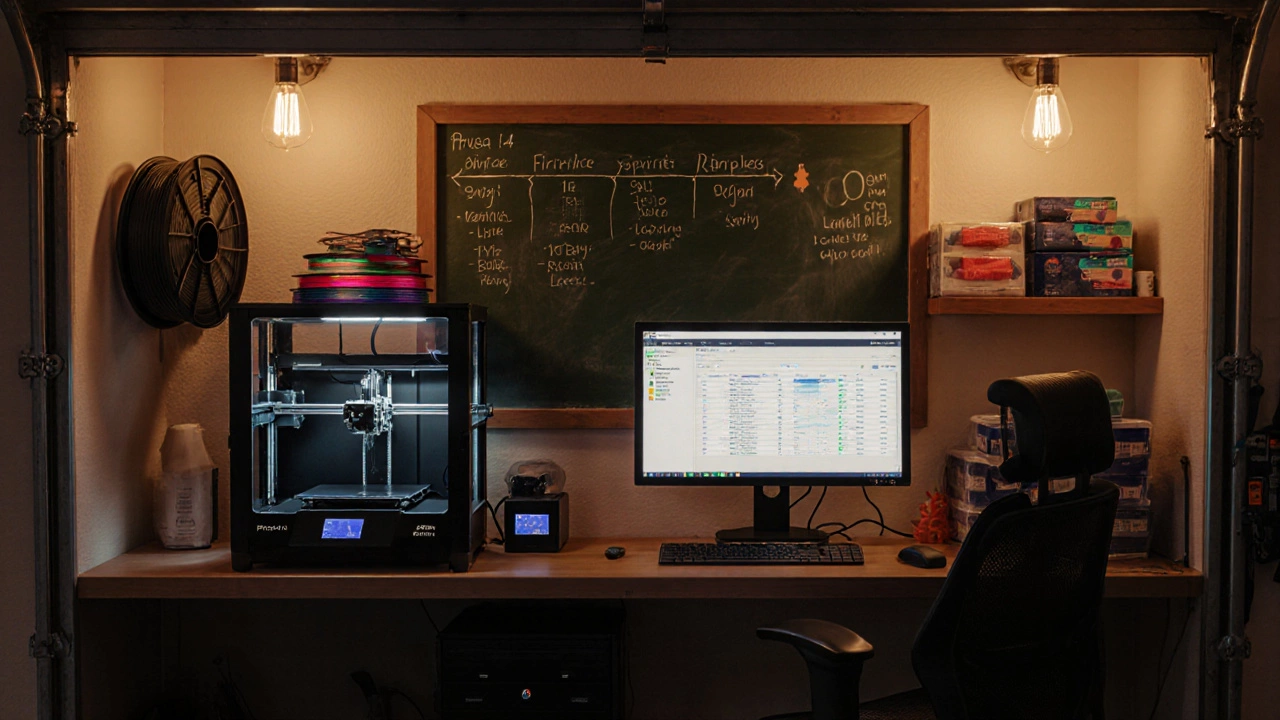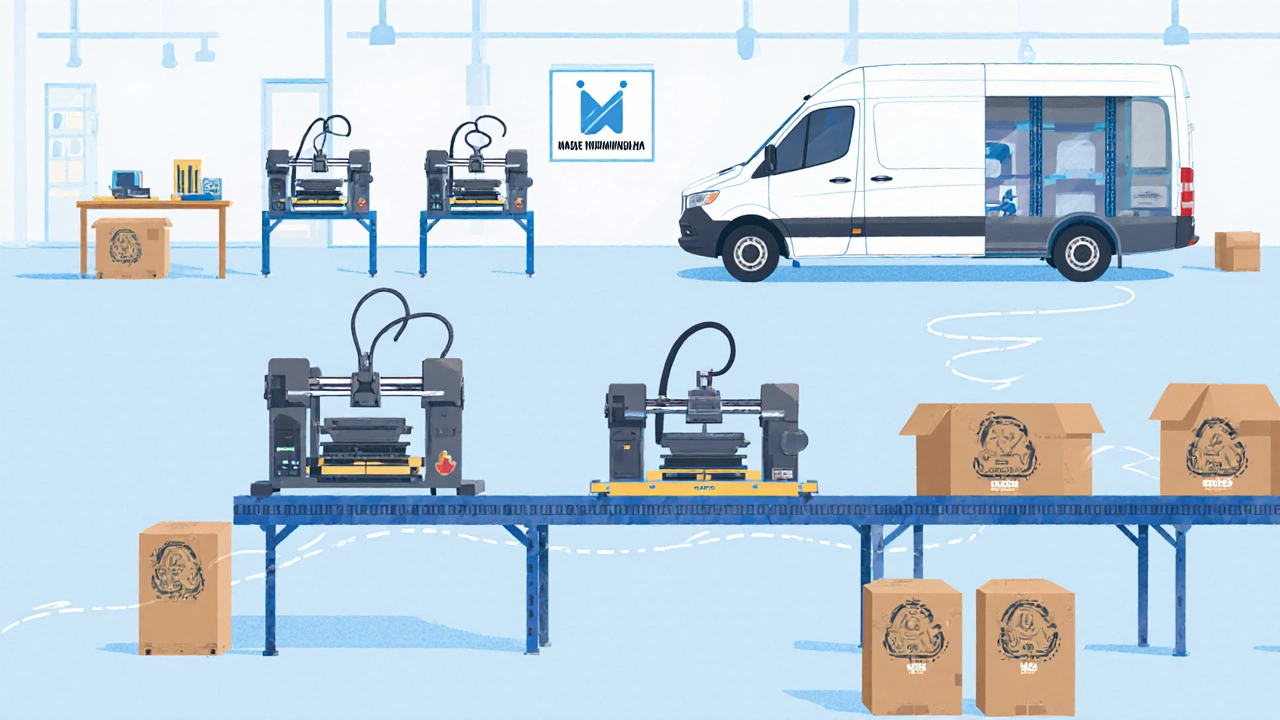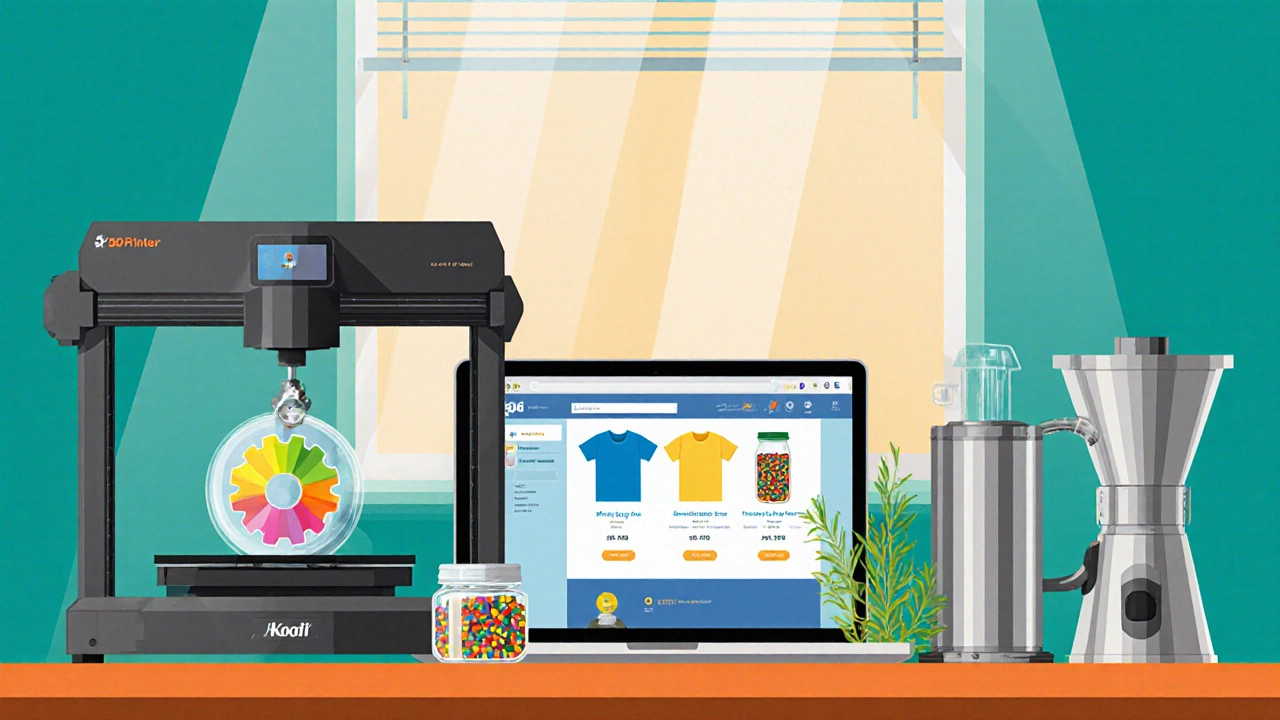Manufacturing Business Comparison Tool
Filter by Your Criteria
Quick Takeaways
- The quickest manufacturing startups need less than 30 days to launch.
- Initial capital can be as low as £2,000 for a home‑based operation.
- 3D printing, custom apparel, and food‑processing kits rank highest for speed and profit.
- Focus on niche demand, minimal inventory, and digital ordering to cut lead times.
- Leverage UK government schemes like the SME Innovation Fund for equipment grants.
When people ask, fastest business to start, they usually picture a low‑cost venture that can roll out in weeks, not months. In the manufacturing world, that means picking ideas that need minimal tooling, a small workspace, and straightforward compliance. Below we break down the fastest‑to‑launch manufacturing ideas for 2025, the exact steps to get them up and running, and the hidden pitfalls you’ll want to avoid.
Fastest business to start is a concept that prioritises speed of market entry, low upfront investment, and quick cash flow generation. While the phrase sounds generic, it becomes actionable once you map it onto specific manufacturing models that meet those criteria.
Why Speed Matters in 2025
Economic uncertainty, supply‑chain disruptions, and tight credit markets mean entrepreneurs can’t wait for a year‑long build‑out. A fast start lets you test demand, iterate on product design, and secure early revenue before competitors lock down the same niche. Moreover, the UK’s post‑Brexit support schemes reward businesses that can demonstrate rapid job creation and export potential.
Key Criteria for the Fastest Manufacturing Startups
- Setup time: Days to a few weeks from idea to first sale.
- Capital requirement: Ideally under £5,000 for equipment and initial stock.
- Skill threshold: Skills that can be self‑taught or acquired via short courses.
- Regulatory load: Minimal licences, especially for low‑risk products.
- Profit margin: At least 30 % after direct costs.
Top 5 Fastest Manufacturing Ideas
Each idea meets the criteria above, but they differ in market size, equipment needs, and scalability.
| Idea | Typical Setup Time | Initial Capital (GBP) | Average Gross Margin | Core Skill Needed |
|---|---|---|---|---|
| 3D printing service | 2‑3 weeks | £3,500 | 35 % | CAD design basics |
| Custom T‑shirt printing | 1‑2 weeks | £2,200 | 40 % | Graphic design, screen‑printing |
| Home‑based food‑processing kits | 3 weeks | £2,800 | 38 % | Food safety, simple packaging |
| Recycled plastic products | 4 weeks | £4,500 | 32 % | Basic molding, sourcing waste |
| Essential oil distillation kits | 3‑4 weeks | £3,000 | 36 % | Botany basics, simple distillation |

Step‑by‑Step Blueprint for a 3D Printing Service
- Validate demand: Post a few prototype prints on local Facebook groups or Reddit’s r/3Dprinting. Track pre‑orders.
- Choose equipment: A mid‑range FDM printer (e.g., Prusa i3 MK4) costs around £600. Add a resin printer for high‑detail parts (£1,200).
- Secure a workspace: A spare garage or a 10 m² loft space works. Ensure proper ventilation for resin.
- Set up a digital storefront: Use Etsy or a simple Shopify page. Connect a payment gateway like Stripe.
- Source filament and resin: Bulk purchases from UK distributors shave 15 % off per kilogram.
- Implement a production workflow: Use free slicing software (Cura) and a Google Sheet to track orders, material usage, and turnaround times.
- Launch with a limited offer: Offer 20 % off the first 20 orders in exchange for testimonials and photos.
- Iterate: Collect feedback, add new materials (e.g., carbon‑filled filament), and expand to small‑batch injection‑molded parts after six months.
Following this checklist, most entrepreneurs can go from zero to first sale within 18 days. The key is to avoid over‑engineering-start with one printer, then scale.
Other Fast‑Start Ideas in Detail
Custom T‑shirt printing is a low‑tech, high‑margin niche that uses screen‑printing or direct‑to‑garment (DTG) machines to fulfill on‑demand orders. You only need a heat press (£300), a few screens (£150 each), and a reliable e‑commerce platform. The biggest win is the ability to use print‑on‑demand services like Printful for overflow, keeping inventory at zero.
Home‑based food‑processing kits are DIY kits for making jams, spice blends, or protein bars that comply with UK food‑safety regulations. Register with your local authority’s food hygiene service (usually a £50 fee). Purchase a small commercial‑grade mixer (£250) and use recycled glass jars for packaging. With social media recipes, you can launch a pre‑order campaign on Kickstarter and hit the market in three weeks.
Recycled plastic products involve collecting post‑consumer plastic, shredding it, and molding simple items like plant pots or storage boxes. The initial investment is a plastic shredder (£1,200) and an injection‑molding machine (mini‑press, £2,800). Partner with local council waste collection for a steady feedstock and qualify for the UK’s “Circular Economy” grant, which can cover up to 30 % of equipment costs.
Essential oil distillation kits let you turn locally sourced herbs (lavender, rosemary) into high‑value oils. A stainless‑steel steam distiller costs about £1,000, and a small batch yields 50 ml of oil worth £30-£45. With a niche focus on aromatherapy, you can reach boutique retailers within a month of setup.
Funding and Support Options in the UK
The fastest start doesn’t mean you have to dip into personal savings. Several schemes are tailored for low‑capital manufacturers:
- SME Innovation Fund: Grants up to £25,000 for equipment that improves sustainability.
- Start‑up Loans (British Business Bank): Low‑interest loans of up to £30,000 with a 12‑month repayment holiday.
- Local Enterprise Partnerships (LEPs): Regional grants that can cover training costs for CAD or food‑safety certifications.
- Enterprise Zones: Reduced business rates for the first three years if you locate in designated zones such as the Birmingham Innovation Campus.
When applying, stress your rapid‑deployment timeline and projected job creation. Decision‑makers love a clear Gantt chart showing a 30‑day launch window.

Common Pitfalls and How to Avoid Them
- Under‑estimating regulatory steps: Even low‑risk food kits need a HACCP plan. Draft it early using free templates from the Food Standards Agency.
- Skipping market validation: A prototype that never sells is a sunk cost. Use pre‑order landing pages to gauge interest before buying materials.
- Over‑investing in equipment: Start with one printer or one screen. Lease or rent extra capacity once demand proves consistent.
- Ignoring cash flow: Fast sales don’t guarantee cash if you’re offering 30‑day payment terms. Keep invoice cycles short or require upfront payment for custom orders.
- Neglecting brand storytelling: Customers buying locally‑made goods care about origin. Highlight “Made in Birmingham” and any sustainability angle on packaging.
Scaling After the First 90 Days
When you hit the first £5,000 in revenue, it’s time to think about growth. Here are three proven pathways:
- Product line extension: Add complementary items (e.g., 3D‑printed keychains for a printing service).
- Wholesale partnerships: Pitch bulk‑order discounts to boutique retailers or local cafés.
- Automation upgrades: Invest in a second printer or a semi‑automatic screen‑printing press to boost throughput by 50 %.
Measure each option against your original speed‑to‑market metric; the goal is to keep expansion as agile as the launch.
Bottom Line
If you need a venture that can be up and running in weeks, focus on ideas that blend digital design, low‑volume production, and direct‑to‑consumer sales. 3D printing, custom apparel, and small‑batch food kits dominate the list for 2025 because they need minimal capital, have clear regulatory pathways, and enjoy strong online demand.
What is the absolute fastest manufacturing business to start?
A home‑based 3D printing service can go from idea to first sale in under three weeks, thanks to low equipment cost and instant digital orders.
Do I need a manufacturing licence for these ideas?
Most fast‑start ideas avoid heavy licensing. Custom T‑shirts, 3D printing, and recycled‑plastic items require only standard health‑and‑safety checks. Food kits need a basic HACCP plan and registration with the local authority.
How much capital is truly needed?
You can launch a functional 3D printing service for roughly £3,500, while a custom T‑shirt set‑up can be done for about £2,200. Both fit comfortably under a £5,000 budget.
Can I get funding for a fast‑start manufacturing business?
Yes. The UK SME Innovation Fund, Start‑up Loans, and regional LEP grants all support low‑capital manufacturing projects, especially those that promise rapid job creation.
What are the biggest risks?
Common risks include under‑estimating regulatory compliance, over‑ordering materials before demand is proven, and cash‑flow gaps caused by delayed payments. Mitigate by validating demand early and keeping inventory lean.






